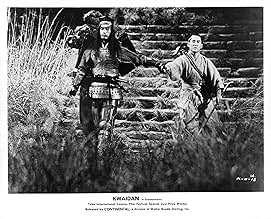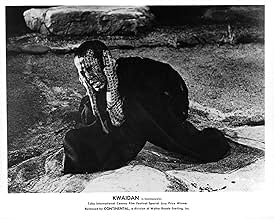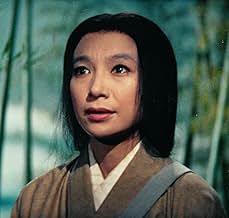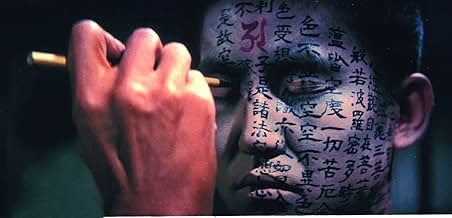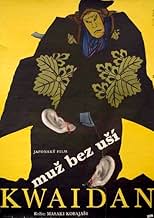CALIFICACIÓN DE IMDb
7.9/10
22 k
TU CALIFICACIÓN
Una colección de cuatro historias tradicionales japonesas con tema sobrenaturales.Una colección de cuatro historias tradicionales japonesas con tema sobrenaturales.Una colección de cuatro historias tradicionales japonesas con tema sobrenaturales.
- Dirección
- Guionistas
- Elenco
- Nominado a 1 premio Óscar
- 5 premios ganados y 3 nominaciones en total
- Dirección
- Guionistas
- Todo el elenco y el equipo
- Producción, taquilla y más en IMDbPro
Opiniones destacadas
10FieCrier
This is one of my favorite horror films, and I daresay one of my favorite films in general as well. Anyone who doubts that a horror film can be great art as well ought to give this one a try.
I will have to revisit this comment after viewing the film again, as it has been a while, but there were a few comments I thought people might find useful regarding the stories the film adapted.
Two of the stories can be found in Lafcadio Hearn's book Kwaidan: Stories and Studies of Strange Things. These are "Hoichi the Earless" ("The Story of Mimi-nashi-Hôïchi") and "The Woman in the Snow" ("Yuki-Onna"). The other two can be found in other books of Hearn's; I'm grateful to Kenji Inadomi for pointing out that "Black Hair" can be found as "The Reconciliation" in Shadowings, and "In a Cup of Tea" is to be found in Kotto: Being Japanese Curios, with Sundry Cobwebs.
Many of Hearn's stories can be found online, including all of the above except "In a Cup of Tea." Attractive early hardcovers of Hearn's books are pretty plentiful, though, and not terribly expensive either.
As some others have noticed, there's an uncredited adaptation of "The Woman in the Snow" as the "Lover's Vow" segment of Tales from the Darkside: The Movie (1990). It's not bad, but Kaidan (1964) is the one that got it right.
I will have to revisit this comment after viewing the film again, as it has been a while, but there were a few comments I thought people might find useful regarding the stories the film adapted.
Two of the stories can be found in Lafcadio Hearn's book Kwaidan: Stories and Studies of Strange Things. These are "Hoichi the Earless" ("The Story of Mimi-nashi-Hôïchi") and "The Woman in the Snow" ("Yuki-Onna"). The other two can be found in other books of Hearn's; I'm grateful to Kenji Inadomi for pointing out that "Black Hair" can be found as "The Reconciliation" in Shadowings, and "In a Cup of Tea" is to be found in Kotto: Being Japanese Curios, with Sundry Cobwebs.
Many of Hearn's stories can be found online, including all of the above except "In a Cup of Tea." Attractive early hardcovers of Hearn's books are pretty plentiful, though, and not terribly expensive either.
As some others have noticed, there's an uncredited adaptation of "The Woman in the Snow" as the "Lover's Vow" segment of Tales from the Darkside: The Movie (1990). It's not bad, but Kaidan (1964) is the one that got it right.
'Kwaidan' is an astonishing film, once seen never forgotten. It's labeled horror, but while the four stories within deal with ghosts and the supernatural, I doubt that anyone would be actually frightened watching it. Haunted, yes, scared, no. It's a beautiful movie, very stylized with a very imaginative use of colour. I can't think of anything else I've seen that comes close. Mario Bava, maybe. The movie consists of four stories. I think it's best watched as a whole to let each story blend in to the other, but if forced to choose I would say my favourite segment is the second one ('The Woman In The Snow') which I believe was left out of the version of the movie originally shown outside Japan. 'Kwaidan' is one of those rare movies that leaves you stunned the first time you see it. For me it's equal to 'Rashomon', 'Woman In The Dunes' and 'Branded To Kill' as the most amazing Japanese movies I've ever seen. Each one of these movies blew my mind. It's difficult not to gush about all four. They come with my highest recommendation. I sincerely believe that anybody who watches them will be incredibly impressed. They are all masterpieces.
Four old ghost stories, updated in the late 19th Century by the Irish-Greek-America Lafcadio Hearne, then reclaimed by Kobayashi Masaki in the 1960's. This really isn't your regular horror movie to put it mildly - All four stories are told in a highly theatrical manner with deliberately stylized studios and acting. Some of the sets are very beautiful, a quite unique cinema experience.
It is, however, very uneven. The first story, 'the Woman of the Black Hair' is lovely in parts, but the ending disappoints (its different from the Lafcadio Hearne original). The second one, the 'Woman of the Snow' is genuinely very creepy and shocking. The third story, 'Hoichi the Earless' is by far the most impressive, with memorable visuals and music. The last story, 'In a Cup of Tea' is a more conventional 'tales of the unexpected' type story and is a little overlong. Its really a bit of a shaggy dog story, not worthy of the others.
There is no doubt that its a very beautiful movie in parts - some sections are genuinely memorable and will likely stick in your mind for a lot longer than the usual ghost stories. I don't think its as good a movie as some other Japanese horror movies of the period such as Onibaba or Woman of the Dunes (both made two years before this). However, it is fascinating in the little insights it gives to the pleasures of traditional Japanese theater.
It is, however, very uneven. The first story, 'the Woman of the Black Hair' is lovely in parts, but the ending disappoints (its different from the Lafcadio Hearne original). The second one, the 'Woman of the Snow' is genuinely very creepy and shocking. The third story, 'Hoichi the Earless' is by far the most impressive, with memorable visuals and music. The last story, 'In a Cup of Tea' is a more conventional 'tales of the unexpected' type story and is a little overlong. Its really a bit of a shaggy dog story, not worthy of the others.
There is no doubt that its a very beautiful movie in parts - some sections are genuinely memorable and will likely stick in your mind for a lot longer than the usual ghost stories. I don't think its as good a movie as some other Japanese horror movies of the period such as Onibaba or Woman of the Dunes (both made two years before this). However, it is fascinating in the little insights it gives to the pleasures of traditional Japanese theater.
Cinematographer Yoshio Miyajima did a marvellous job, although most of the visuals in this masterpiece are obviously invented by Kobayashi. It is clearly studio-work, but Kobayashi turns that to his advance by making the most marvellous background paintings I've ever seen in a movie and his virtuosity comes to full exposure in the light effects that are fabulous for such an old film. That together with the beautiful colors creates a mesmerizing and sometimes terrifying experience. 'Marco the magnificent' (Patelliere&Howard, 1964) reminded me of the visuals in Kwaidan, because of the beautiful environmental shots and because of the (supposed) history of mixture of eastern and western stories. Forget that movie instantly plz. Another film that has nothing to do with this one, but is brilliant and comparable only because of the episode structure, the fairy-tale nature and great cinematography is Kaos (Taviani, 1984).
Kwaidan has such a haunting effect because of the scary music and the sound effects are unnerving(-ly edited). Some call it horror. I thought the pace was rather slow for horror, but it is a film that does not let go easily. The actors (one of which is Takeshi Shimura) convince enthusiastically and they too make it an entertaining film. According to the user-rating this is Kobayashi's least interesting work of these three: Joi-uchi, Seppuku, and Kwaidan. I can't wait to see the other two, although I don't think they can surpass this masterpiece.
10 points out of 10 :-)
Kwaidan has such a haunting effect because of the scary music and the sound effects are unnerving(-ly edited). Some call it horror. I thought the pace was rather slow for horror, but it is a film that does not let go easily. The actors (one of which is Takeshi Shimura) convince enthusiastically and they too make it an entertaining film. According to the user-rating this is Kobayashi's least interesting work of these three: Joi-uchi, Seppuku, and Kwaidan. I can't wait to see the other two, although I don't think they can surpass this masterpiece.
10 points out of 10 :-)
There's a good bit of discussion of this film as "horror"; may I suggest that it's horrific in the sense of the ancient Greek tragedies. There's no attempt to coerce your Hollywood-abused adrenals into delivering just one more squirt by means of some in-your-face special effect. In fact, for each of these slowly developed stories, once you've understood the premise, the story will unfold pretty much as you've guessed it must, inexorably, relentlessly. The ghosts aren't there to "spook" us, they're to show us our common human spiritual and emotional failings. The horror of a ghost wife, for instance, isn't that her chains drag noisily across the the hardwood parquet floor, but that we've created her by our insensitivity, our misplaced values, or our betrayals.
The visual style is stupendous! The action takes place in a disappeared, iconic world of classical medieval Japan, perfect, and admitting no trace of the reality of modern times. Overlaid is a European Expressionist color sensibility, with emotionally charged color displacements of sky and skin, as if Hokusai and Ernst Ludwig Kirchner had been working cooperatively on the sets and lighting.
This is a wonderful movie. Please ignore attempts to fit it into some box, some genre. Rather look at it as a mature work of art, which happens to choose old Japanese ghost stories as its starting point.
The visual style is stupendous! The action takes place in a disappeared, iconic world of classical medieval Japan, perfect, and admitting no trace of the reality of modern times. Overlaid is a European Expressionist color sensibility, with emotionally charged color displacements of sky and skin, as if Hokusai and Ernst Ludwig Kirchner had been working cooperatively on the sets and lighting.
This is a wonderful movie. Please ignore attempts to fit it into some box, some genre. Rather look at it as a mature work of art, which happens to choose old Japanese ghost stories as its starting point.
¿Sabías que…?
- TriviaThe four vignettes were chosen to represent the four seasons of the year.
- Errores(at around 2h 25 mins) In the segment "Miminashi Hôichi no hanashi", Donkai says he covered all of Hôichi's body with the sacred writing, but when Hôichi is writhing on the floor after the ghost's attack, his thighs (which in the shots were supposed to be covered by his robe) are visible for a couple of seconds and are clearly unmarked.
- Citas
Hoichi (segment "Miminashi Hôichi no hanashi"): As long as I live, I'll continue to play the biwa. I'll play with all my soul to mourn those thousands of spirits who burn with bitter hatred.
- Versiones alternativasOriginally a four-episode anthology released in Japan at 183 minutes. The USA version removes the second episode, starring Keiko Kishi and Tatsuya Nakadai, in order to shorten the running time to 125 minutes.
- ConexionesEdited into Spisok korabley (2008)
Selecciones populares
Inicia sesión para calificar y agrega a la lista de videos para obtener recomendaciones personalizadas
2025 Venice Film Festival Guide
2025 Venice Film Festival Guide
See the full lineup for the 2025 Venice Film Festival, taking place Aug. 27 – Sept. 9, 2025.
- How long is Kwaidan?Con tecnología de Alexa
Detalles
Taquilla
- Presupuesto
- JPY 350,000,000 (estimado)
- Tiempo de ejecución
- 3h 3min(183 min)
- Relación de aspecto
- 2.35 : 1
Contribuir a esta página
Sugiere una edición o agrega el contenido que falta


